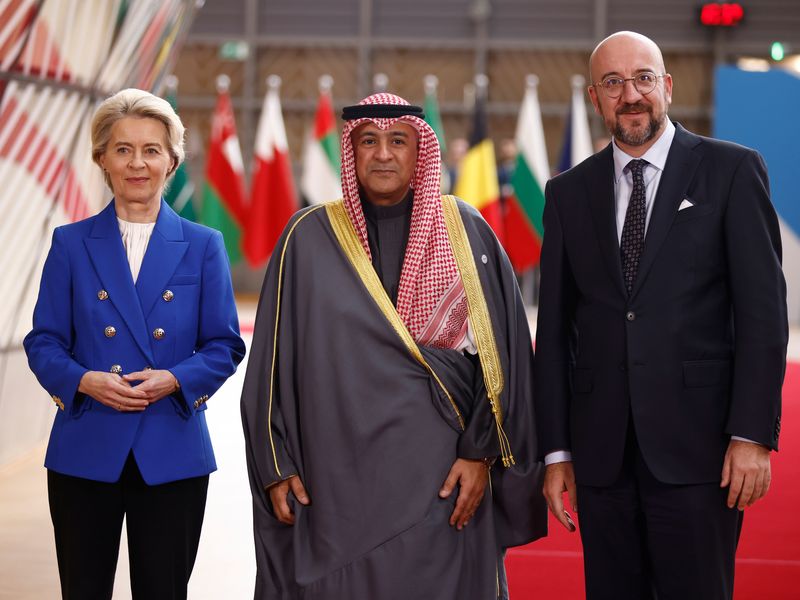 Have the article read by OpenAI (Beta). Please note that AI translations may take some time to process.
Have the article read by OpenAI (Beta). Please note that AI translations may take some time to process.Brussels (dpa) – European Union and Gulf nations on Wednesday agreed on closer corporation and pledged to overcome differences in the face of multiple global conflicts at a summit in Brussels.
“In Europe and the Gulf, we share a genuine wish to work much more together and to build bridges,” European Council President Charles Michel said.
“We are keen to promote all our fields of cooperation, be it regional or international,” said Sheikh Tamim bin Hamad Al Thani, the emir of Qatar and co-host of the summit. Tamim named international trade, the exchange of expertise, the fight against climate change and the promotion of the economy as areas of interests.
The EU’s first official summit with the six Gulf states Bahrain, Kuwait, Oman, Qatar, Saudi Arabia and the United Arab Emirates – which form the Gulf Cooperation Council – marks a cornerstone in a rapidly changing relationship. Mineral fuel imports from the region to the EU have tripled since 2020, exacerbated by Russia’s full-scale invasion of Ukraine and the subsequent drastic change in Europe’s energy supply sources.
Saudi Crown Prince Mohammed bin Salman attended the summit, six years after the brutal murder of journalist Jamal Khashoggi at Saudi Arabia’s consulate general in Istanbul in 2018 was met with condemnation and outrage in the EU.
The EU is currently the region’s second-largest trade partner, generating €170 billion in 2023, according to EU figures. Negotiation on a free trade agreement between the two regions began in 1990, but were suspended in 2008 due to various challenges.
Energy, trade and Russia
Next to energy and trade, the regions also dealt with more contentious topics such as the EU’s support for Ukraine and condemnation of Russia’s actions, the conflict in the Middle East and visa policy.
Negotiations ahead of the meeting on a joint declaration had proven difficult particularly on Russia’s war against Ukraine. According to EU diplomats, the Gulf states did not want the text to call for a renunciation of support for Russia, but wanted arms deliveries to all parties to be stopped instead.
The final declaration called on Russia to withdraw its troops in line with United Nations resolutions, recalled the UN Charter and said that “all states must refrain from the threat or use of force to seek territorial acquisition.”
European Commission President Ursula von der Leyen stressed the importance of closer ties between the regional organisations. “Conflicts around us demand urgent responses,” she said. “We all know how hard it is to overcome the bitterness of war. But it can be done to choose growth over conflict, to replace war with cooperation and to turn hostility into opportunities.”
The next summit between the two regions will be held in Saudi Arabia in 2026. (October 16)
The editorial responsibility for the publication lies with dpa.
